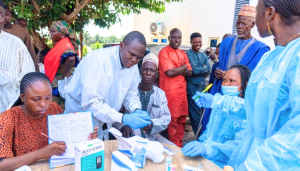Prioritise your health by knowing your blood sugar status and living a healthy lifestyle
Lagos,18 November, 2024 - When 52-year-old Adeola Akinyemi, a trader residing in Lagos, received her Type 2 diabetes diagnosis ten years ago, her world shifted. The news came as a shock, yet it set her on a journey that would change her dietary and sedentary lifestyle.
“I remember feeling constantly tired, always thirsty, and frequent the toilet at night”, says Adeola. “I was losing weight rapidly despite eating well. It wasn’t until I went for a routine check-up that I discovered my blood sugar levels were dangerously high.”
Her journey with the condition has been challenging, but she is relentless and has adapted to a new lifestyle that she said is helping her keep healthy.
Adeola’s approach to managing diabetes is one of balanced commitment and consistency. She emphasises that her journey to acceptance and control began with knowledge and awareness.
After her diagnosis, Adeola sought guidance from healthcare professionals, dietitians, and diabetes support groups. This network of support became crucial in helping her understand what it meant to live with diabetes and how to keep her blood sugar levels in check.
Adeola has since made significant lifestyle changes to manage her diabetes. She follows a strict diet, exercises regularly, uses her medication and monitors her blood sugar levels regularly. “It’s not easy, but necessary,” she says. “I want to be there for my children and live a healthy life.”
Diabetes awareness and a healthy lifestyle
Although Adeola’s story is not unique, many are unaware of their status. According to the World Health Organization (WHO), globally, in 2021, 537 million people, or about 10.5% of the world's population, had diabetes, many of whom are unaware of their condition and its complications.
Diabetes (high blood sugar) is a chronic health condition that affects how the body converts food into energy. Diabetes prevalence has been rising more rapidly in middle and low-income countries, including Nigeria. The disease is a major health concern, with secondary complications including blindness, kidney failure, heart attacks, stroke and lower limb amputation.
Nigeria has the highest incidence of diabetes in sub-Saharan Africa. The WHO estimates that the prevalence of diabetes in Nigeria is 4.3%. The high prevalence is primarily attributed to the lifestyle changes caused by urbanisation and its results in industries producing unhealthy diets, including sugar-sweetened drinks, lack of exercise, tobacco use, and harmful use of alcohol.
A Call to Action: Knowing Your Status Can Save Lives
With the 2024 World Diabetes Day commemorated, Dr Walter Kazadi Mulombo, WHO Nigeria Country Representative, emphasises the importance of diabetes education/awareness, early detection, and a healthy lifestyle.
Dr Mulombo said, “This year’s theme, “Breaking Barriers, Bridging Gaps, “underpins our commitment to reducing the risk of diabetes and ensuring that all people diagnosed with diabetes have access to equitable, comprehensive, affordable, and quality treatment and care.
“Knowing one’s diabetes status can indeed be life-saving. “On World Diabetes Day today, I urge individuals, communities, governments, health workers, policymakers and civil society organisations to join hands and act now. For individuals, prioritise a healthy lifestyle, and if you’re already living with diabetes, have regular medical check-ups.
Communities can play their role by creating supportive environments that promote healthy living, reduce stigma, and provide access to affordable diabetes care and education. For governments, we fully support your efforts to implement policies that enhance access to essential medicines, strengthen primary healthcare systems, and foreground investment in diabetes prevention and care”.
Taking deliberate steps
The WHO has been supporting the Nigerian government in its efforts to combat the disease.
With the support of WHO, the Federal Ministry of Health has developed and launched a Multisectoral Action Plan to reduce the morbidity and mortality from noncommunicable diseases (NCDs). This plan includes cost-effective policies and social interventions to influence behaviours and lifestyle changes.
Recently, the WHO supported Nigeria’s Governors Forum in conducting Project 10 Million, tagged Know Your Numbers, Control Your Number, to screen 10 million people for hypertension and diabetes. The campaign served as an opportunity to raise awareness about NCDs as a major public health problem requiring urgent intervention.
For Adeola and millions like her, World Diabetes Day is a reminder that while diabetes may be a part of her life, it doesn’t define her. And with early detection and proactive management, it can be managed.
Her advice to others is clear: everyone should check their health status and take control of their health. Diabetes is not a death sentence. It’s an opportunity to rethink our health and lifestyle,”



